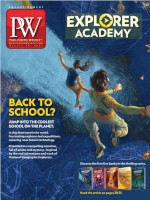I love libraries. I suspect I am in good company with those reading this magazine. My pandemic surprise is that I love libraries more now than I did at the start of 2020. I picked up two pandemic hobbies, thanks to the library. I started listening to audiobooks for the first time, and I began walking long distances every day. I did neither of those things prior to the pandemic. Sitting and reading is still my favorite “hobby,” but there is now room in my heart for walking and reading, too, thanks to the Montgomery County Public Libraries here in Maryland.
A key discovery for me that everyone else might already know: you can adjust the speed of audiobooks! Pre-pandemic, I had assumed that it took too long to listen to a book. During the early pandemic, I had trouble concentrating on physically reading a book—but hearing the right book read by the right reader is like a night on Broadway. The people invading my brain and my ears transported me in the way books have always transported me, and I am beyond grateful.
Recently, I was walking in a local park, listening to Local Woman Missing by Mary Kubica. I am scared of my own shadow, so it was an unusual choice for me. But my library suggested it; who am I to argue?
While I was listening to a particularly terrifying bit, another walker had the audacity to cross in front of me. I startled and screamed, and the explanation—“I’m listening to a scary book; it’s really good....”—didn’t connect with the appropriately startled walker. (I have seen her since while walking, and notice she always moves to the other side of the path.)
Listening to audiobooks led to some new observations. Describing Empire of Pain to my son, who introduced me to the spectacular Say Nothing, I told him that the author, Patrick Radden Keefe, “read it to me.” I laughed out loud listening to Mary Beth Keane’s Ask Again, Yes (an Irish mother-in-law who redefines complicated questions her granddaughter’s name, asking if it is a saint’s name). As an Irish American, those references are readily accessible to me.
A “duh” win for me from listening to books is hearing the words the way the author intended. For me, that adds valuable context when listening to books like An American Marriage by Tayari Jones, Firekeeper’s Daughter by Angeline Boulley, Of Women and Salt by Gabriella Garcia, and What’s Mine and Yours by Naima Coster.
While I found new reasons to love the library during the pandemic, don’t think for a moment I gave up all the reasons I always have loved libraries.
Before I figured out how to safely order groceries online, the library sent out an email explaining their genius “holds-to-go” program. While audiobooks were my newest friends, I never gave up on physical books, and the library kept me in stock. When I picked up books on hold, I noticed families just outside the library using the Wi-Fi, and it reminded me that while libraries largely provide highly valued convenience and fun for me, they provide key access to others in my community.
While Patience and Fortitude were being masked, librarians all over the country were innovating. I serve on my local friends of the library board, and our first pandemic support effort to the library was to acquire Zoom licenses. Overnight, classes designed to be in person became virtual.
Story times, conversation classes, book clubs, games, yoga, and other activities all became accessible online. I also attended more library programs than ever before: classes on using Zoom, on financial literacy, on volunteer opportunities; programs featuring great authors. I realized anew how much the library creates and fosters community.
I learned how others use their library cards—borrowing movies, TV shows, games—and my admiration for an institution I always loved grew. Here is an example of a successful way libraries adapted during the pandemic: Each year, our libraries, in partnership with the public schools and library friends, offers MOSAIC, an annual language-arts program for middle school students to showcase creative talents and express cultural identities. The competition asks students to creatively express their reflections on diversity and culture. MOSAIC was held virtually last year, but it still rewarded creativity, created a love of words, and minted some newly published authors.
It is always a good idea to host storytimes for young readers, foster human connection, talk about books, and provide access. During a pandemic, though, it’s a brilliant one.
Libraries are always told to do more with less and miraculously (with hard work, talent, and determination) figure out a way ahead to serve the community. To everyone working in the library, thanks for making life better, bigger, more fun, more connected, and more engaging at a scary time.
Denise Neary is on the board of Maryland’s Friends of the Library of Montgomery County and is a card-carrying member of the public library.
Correction: An earlier version of this article initially misnamed Mary Kubica.



 Volume 268
Issue 33
08/16/2021
Volume 268
Issue 33
08/16/2021





